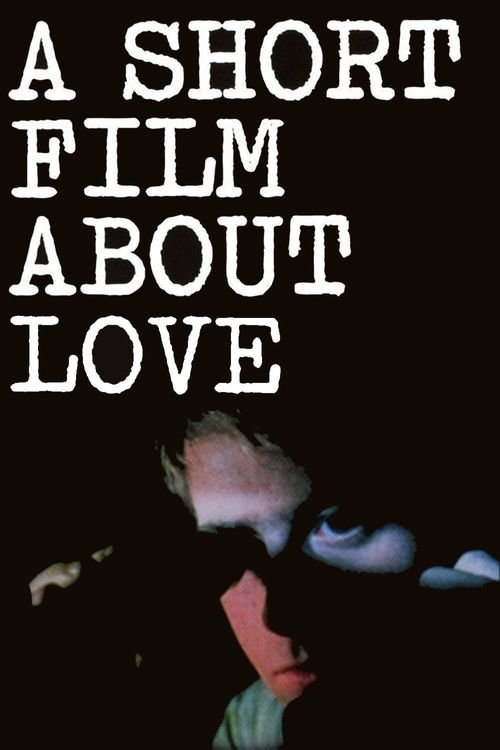
Escrita y dirigida por Krzysztof Kieślowski
If the name Krzysztof Kieślowski doesn't ring a bell, that's fine, I can understand, I know it's a hard name to remember, but if talking about titles like La Double Vie de Véronique, No End, A Short Film About Killing or the Trilogy of Colors don't ring a bell either, then I do think you should review your to-watch list and include perhaps the most celebrated film director from his native Poland and certainly one of the most important filmmakers of the 20th century.
Si el nombre de Krzysztof Kieślowski no les dice nada, está bien, lo puedo entender, sé que es un nombre difícil de recordar, pero si hablar de títulos como La Double Vie de Véronique, No End, A Short Film About Killing o la Trilogía de los colores tampoco les dice nada, entonces sí creo que deberían revisar su lista de películas por ver e incluir al que tal vez sea el director de cine más célebre de su Polonia natal y sin duda uno de los cineastas más importantes del siglo XX.
In the late 1980s, Kieslowski directed a television miniseries called Dekalog (The Decalogue), ten hour-long episodes that explored certain ethical and moral dilemmas surrounding the ten commandments of the Catholic religion. The sixth episode, Dekalog: Six, focused on the idea of "thou shalt not commit adultery", and it was this story that the Polish director expanded for his Krótki film o milosci (A Short Film About Love). It tells the story of Tomek, a 19-year-old who works at the post office and currently lives with the mother of one of his friends who has been out of the country for a few months. Tomek seems like a quiet boy, not very communicative, not very interested in hanging out in bars, going out or having friends (in fact, he doesn't seem to have any friends other than the ones abroad) but he hides a secret, tender and murky in equal parts: he's obsessed with a woman. It may seem like a very serious thing to talk about obsession, but that's what it is. First through binoculars and then through a telescope, Tomek observes Madga, an attractive, blonde woman in her thirties who lives in the opposite building. Every evening, the voyeur sets an alarm, at the approximate time when Magda arrives home, and dedicates himself to watching her while she receives her various lovers, or walks around her apartment in scant clothing, not suspecting that her windows are the screen for her young neighbor's favorite tv show.
A finales de los años ochenta, Kieslowski dirigió una miniserie para televisión llamada Dekalog (The Decalogue), diez episodios de una hora de duración en el que se exploraban ciertos dilemas éticos y morales alrededor de los diez mandamientos de la religión católica. El sexto episodio, Dekalog: Six, se centraba en la idea de "no cometerás adulterio", y fue esa historia la que el director polaco amplió para su Krótki film o milosci (A Short Film About Love). En él se cuenta la historia de Tomek, un joven de 19 años que trabaja en la oficina postal y que actualmente vive con la madre de uno de sus amigos que se encuentra, desde hace algunos meses, fuera del país. Tomek parece un chico tranquilo, no muy comunicativo, poco interesado a andar en bares, salir o tener amigos (de hecho, no parece tener más amigos que el que se encuentra fuera) pero oculta un secreto, tierno y turbio a partes iguales: está obsesionado con una mujer. Puede parecer algo muy serio hablar de obsesión, pero es que eso es lo que es. A través de unos prismáticos primero y de un telescopio después, Tomek observa a Madga, una mujer rubia, atractiva, de unos treinta y tantos años que vive en el edificio de enfrente. Cada tarde, el voyeur coloca una alarma, a la hora aproximada en la que Magda llega a casa, y se dedica a observarla mientras ella recibe a sus diferentes amantes, o se pasea en poca ropa por su departamento sin sospechar que sus ventanas son la pantalla del programa favorito de su joven vecino.

Contrary to what one might think at first, Tomek doesn't spy on Magda in order to obtain sexual pleasure. Deep down, the boy feels that he loves this woman. That is why he's jealous of the men who come to visit her and that's why he also begins to devise plans to interrupt Magda's dates and little by little he's looking for a way to enter her life in a more direct way. But how is it possible for him to say that he loves her? How can you love someone you don't know? Yes, it's strange, but even though the woman doesn't even suspect Tomek's existence, she's not completely unknown to him.
Contrario a lo que uno pudiera pensar al inicio, Tomek no espía a Magda con el fin de obtener placer sexual. En su fuero interno, el chico siente que ama a esta mujer. Por eso siente celos de los hombres que llegan a visitarla y por eso también comienza a idear planes para interrumpir las citas de Magda y poco a poco va buscando la forma de entrar en su vida de una manera más directa. Pero ¿cómo es posible que diga que la ama? ¿cómo se puede amar a alguien a quien no conoce? Sí, es extraño, pero aunque la mujer no sospecha ni siquiera de la existencia de Tomek, ella no es del todo una desconocida para él.
Not only because he has been watching her for a year, night after night, he knows her routine, her quirks, he can even tell the lovers Magda has had during that time apart, but because he has also seen her personally on the street. They are neighbours, they walk around the neighbourhood, he has seen her in the supermarket. He has even served her at the cash register of the post office where the boy works. For him, she's a constant presence in his life and in his mind. For her, he's a shadow she has never seen. Until, in an impulsive moment, Tomek confesses to Magda that he loves her and tells her that he has been spying on her. Far from immediately denouncing him (which would probably be what would happen today) or feeling offended, the woman is first sceptical, then curious and little by little, Tomek reveals to her the things he has observed, what he knows about her, how he has invaded her privacy in unsuspected ways and why he says he loves her. Magda's attitude is a mixture of gratitude and compassion. For her, Tomek is a boy who believes in love, who has not yet realized that in real life such things do not exist. The men she has loved and who have loved her have also gone, love? It only exists in books. That the boy has been spying on her? She finds it a little flattering, but she doesn't believe it's so serious. However, their interactions become more intense and events occur that add more reflection and drama to the story.
No sólo porque lleva un año observándola, noche tras noche, conoce su rutina, sus manías, incluso puede diferenciar a los amantes que Magda ha tenido durante ese tiempo, sino porque también la ha visto personalmente en la calle. Son vecinos, caminan por el barrio, la ha visto en el supermercado. Incluso la ha atendido en la taquilla de la oficina postal en la que trabaja el chico. Para él, ella es una presencia constante en su vida y en su mente. Para ella, él es una sombra que no ha visto nunca. Hasta que, en un momento impulsivo, Tomek le confiesa a Magda que la ama y le cuenta que la ha estado espiando. Lejos de denunciarlo de inmediato (cosa que probablemente sería lo que ocurriría hoy día) o de sentirse ofendida, la mujer se muestra escéptica primero, curiosa después y poco a poco, Tomek le va revelando las cosas que ha observado, lo que sabe de ella, cómo ha invadido su privacidad de maneras insospechadas y por qué dice amarla. La actitud de Magda es una mezcla de agradecimiento con compasión. Para ella, Tomek es un niño que cree en el amor, que aún no se ha dado cuenta de que en la vida real esas cosas no existen. Los hombres que ha amado y la han amado también se han ido, ¿amor? Sólo existe en los libros. ¿Que el chico la ha estado espiando? lo encuentra un poco halagador, pero no cree que sea para tanto. Sin embargo, sus interacciones van ganando en intensidad y se suscitan acontecimientos que añaden mayor reflexión y dramatismo a la historia.

Through the screen we observe Tomek as he observes Magda. In a way we also violate their privacy because we peek into their lives without them suspecting our existence and that makes us think and analyze the limits of privacy in today's world. Those who live in an apartment overlooking another building will want to close the curtains all day after watching this film.
A través de la pantalla nosotros observamos a Tomek como él observa a Magda. De alguna forma nosotros también violamos su privacidad porque nos asomamos a sus vidas sin que ellos sospechen de nuestra existencia y eso nos hace pensar y analizar los límites de la privacidad en el mundo de hoy. Quienes vivan en un departamento con vista a otro edificio, van a querer cerrar las cortinas todo el día después de ver esta película.
There is much to be said against voyeurism, especially in Tomek's case, but there is in his attitude a kind of tribute, of admiration, of deification of the object of his love (and of his desire) that subverts the typical sexual roles of this type of interaction (at least in the cinema). Tomek is the one spying, but it's Magda who has him in her power, who seeks to manipulate him, break him, defeat him and put an end to this innocent and naive vision of the world and of love. The script, written by the director together with Krzysztof Piesiewicz, makes us reflect also on the limits of love or the place from which an attraction can be born. Passion, obsession, love, desire, can they not be emotions interconnected in some way? Do they not all arise spontaneously within the human heart? With irony, wit and a drama not devoid of humor, Kieślowski subverted the statement of the sixth commandment and left us a great film that appears as the best Polish film of all time on Filmaffinity. In that list, the director himself has three of his titles in the Top 10. We know that the ranking is given by the votes of thousands of users of the site, but isn't that enough to arouse curiosity about this filmmaker? If you don't know him yet, I recommend that you start with La Double Vie de Véronique and you will be able to get an idea of the distinctive style of this great director. Have any of you seen films by Krzysztof Kieślowski? I'll read you in the comments.
Es mucho lo que se puede decir en contra del voyeurismo, sobre todo en el caso de Tomek, pero hay en su actitud una especie de tributo, de admiración, de endiosamiento del obejto de su amor (y de su deseo) que subvierte los roles sexuales típicos de este tipo de interacciones (al menos en el cine). Tomek es quien espía, pero es Magda quien lo tiene en su poder, quien busca manipularlo, romperlo, derrotarlo y acabar con esa visión inocente e ingenua del mundo y del amor. El guión, escrito por el director conjuntamente con Krzysztof Piesiewicz, nos hace reflexionar también sobre los límites del amor o el lugar desde el cual puede nacer una atracción. Pasión, obsesión, amor, deseo, ¿no pueden ser emociones interconectadas de alguna forma? ¿no nacen todas espontáneamente dentro del corazón humano? Con ironía, agudeza y un drama no exento de humor, Kieślowski subvirtió el enunciado del sexto mandamiento y nos dejó una gran película que figura como la mejor película polaca de todos los tiempos en Filmaffinity. En ese listado, el mismo director tiene tres de sus títulos en el Top 10. Sabemos que el ranking viene dado por la votación de los miles de usuarios de la página, pero ¿acaso no es suficiente para despertar la curiosidad sobre este cineasta? Si aún no lo conocen, les recomiendo que empiecen por La Double Vie de Véronique y podrán hacerse una idea del estilo tan distintivo de este gran director, ¿alguno de ustedes ha visto películas de Krzysztof Kieślowski? Los leo en los comentarios.







Hello cristiancaicedo!
It's nice to let you know that your article will take 14th place.
Your post is among 15 Bestszejq articles voted 7 days ago by the @hive-lu | King Lucoin Curator by
You receive 🎖 0.2 unique LUBEST tokens as a reward. You can support Lu world and your curator, then he and you will receive 10x more of the winning token. There is a buyout offer waiting for him on the stock exchange. All you need to do is reblog Daily Report 434 with your winnings.
Buy Lu on the Hive-Engine exchange | World of Lu created by szejq (Lucoin) and get paid. With 50 Lu in your wallet, you also become the curator of the @hive-lu which follows your upvote.
STOPor to resume write a wordSTARTExcelente tu reseña crítica, con acertadas reflexiones, de este llamativo filme de Kieślowski, sin duda un autor de culto. Esta realización no la he visto, pero sí su famosa trilogía. El voyeurismo es una práctica casi cotidiana y común, aunque no se reconozca. Saludos, @cristiancaicedo.
Muchas gracias por leerme y comentar. No tengo dudas de que disfrutarías esta película. Saludos.
Thank You very much for this review. I saw most of Kieślowski’s films when I was a student right after their premiere. They played a special role in Polish cultural life. He was a bit overshadowed by Wajda and Zanussi at that time. I’m so glad he is estimated so highly today. His films certainly make one reflect about crucial problems of human life which make us so close to each other, whether we live in Europe, America or anywhere else.
Thank you so much for leaving a comment. I've seen a lot of polish cinema (there are several great directors) but Kieslowski might be my favorite (I also love Pawlikowski). Greetings.